Early Learning Nation explores the world of early learning by connecting with advocates, community leaders, early learning professionals, parents and caretakers, national policymakers and scientists.
In our new series, six top voices from the field discuss a single topic through many lens. This month’s topic? Literacy. Here are our experts:
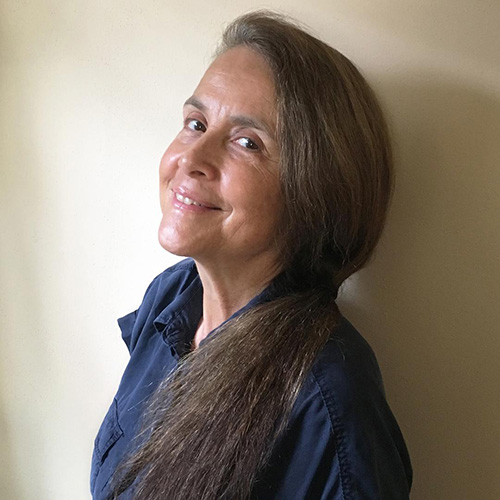  Naomi Shihab Nye is Young People’s Poet Laureate (Poetry Foundation) and on faculty at Texas State University. Naomi Shihab Nye is Young People’s Poet Laureate (Poetry Foundation) and on faculty at Texas State University. |
Naomi Shihab Nye: Finding New Worlds, Voices, Meaning, Friends
What I recall about learning to read was, the world opened up. Everything became mine – books, menus, papers, signs. Suddenly a child’s small, life expanded into a wider map, embracing camaraderie with countless voices – Langston Hughes, Elizabeth Coatsworth, the poems of Robert Louis Stevenson in a richly illustrated volume inviting me to lie abed on my own pillow to conjure things far away. I gained a magic wand, a shining torch for days that felt confusing or anxious. To lose the lasso of here-and-nowness—what adults forever strive to return to—was to feel my own tiny mind and voice rising up into air where Emily Dickinson’s voice lived, proclaiming she was nobody. Yes! I heard her, before I read her. The child who is regularly read to gains a richness of text they will forever feel surrounding them. Now I had a miraculous sense of phrase, an ability to hold a line. I could tuck words into mind, and go off to meadows, trees, but return to find those stories and poems waiting for me, in larger, more rooted time. And never be lonely again. Everyone who had shared their voices, made a book, was potentially a friend. Listen to On Being with Krista Tippett to hear the interview with Nye: “Before You Know Kindness As the Deepest Thing Inside…” |
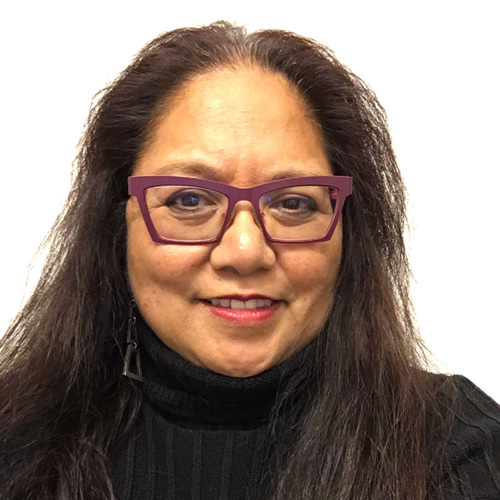  Anita Merina is the National Board Chair for the Little Free Library nonprofit organization, which builds community, inspires readers and expands book access for all through a global network of volunteer-led little libraries. A longtime advocate for literacy and diversity, Anita spent 28 years at the National Education Association, as writer and coordinator of NEA’s Read Across America program. Anita Merina is the National Board Chair for the Little Free Library nonprofit organization, which builds community, inspires readers and expands book access for all through a global network of volunteer-led little libraries. A longtime advocate for literacy and diversity, Anita spent 28 years at the National Education Association, as writer and coordinator of NEA’s Read Across America program. |
Anita Merina: A Community Lifeline in Little Free Libraries
In 2009, the first Little Free Library was built in Hudson, Wisconsin. The goal was simple: share books, build community. We know book access is vital to improving literacy. Studies show having books in the home greatly improves reading skills, academic performance, and future success. Yet two out of three children living in poverty have no books to call their own. Forty-five percent of our nation’s children live in neighborhoods that lack public libraries and bookstores. Little Free Libraries have become a lifeline. They are open 24/7, free to use, and offer an inclusive space for readers of all ages, abilities and backgrounds. They’re in urban, suburban, rural and Native communities in front yards, public parks and schoolyards, as well as laundromats, police stations, barber shops and more. Many are now in under-resourced communities through grants from our Impact Library program. Our Read In Color program shares diverse books, amplifying much-needed voices to reflect and enrich our communities. Today there are more than 100,000 Little Free Libraries worldwide, in all 50 states, 110 countries and 7 continents, even the South Pole. More than 42 million books are shared each year by our caring stewards. From one small seed, big things can grow. Visit the site to learn how to build community, inspire readers and expand book access for all. You can even find plans for building your own library with tips for installation. |
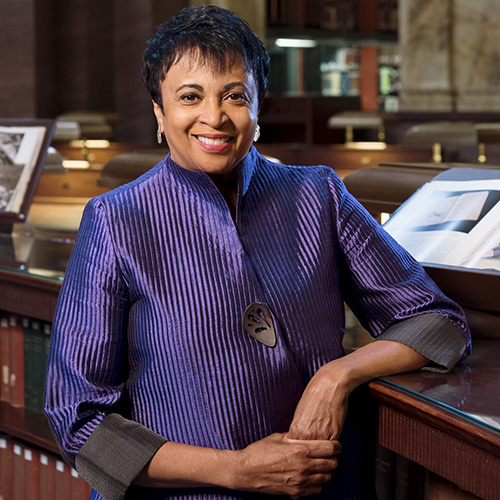  Prior to her latest post she served, since 1993, as CEO of the Enoch Pratt Free Library in Baltimore, Maryland. Hayden was nominated by President Obama to be a member of the National Museum and Library Services Board in January 2010 and was confirmed to that post by the Senate in June 2010. Prior to joining the Pratt Library, Hayden was deputy commissioner and chief librarian of the Chicago Public Library from 1991 to 1993. She was an assistant professor for Library and Information Science at the University of Pittsburgh from 1987 to 1991. Hayden was library services coordinator for the Museum of Science and Industry in Chicago from 1982 to 1987. She began her career with the Chicago Public Library as the young adult services coordinator from 1979 to 1982 and as a library associate and children’s librarian from 1973 to 1979. Hayden was president of the American Library Association from 2003 to 2004. In 1995, she was the first African American to receive Library Journal’s Librarian of the Year Award in recognition of her outreach services at the Pratt Library, which included an after-school center for Baltimore teens offering homework assistance and college and career counseling. Hayden received a B.A. from Roosevelt University and an M.A. and Ph.D. from the Graduate Library School of the University of Chicago. Photo: Shawn Miller |
Dr. Carla Hayden
I am true believer in the power of books. As Frederick Douglass said “Once you learn to read, you will be forever free.” I started my career as a children’s librarian and saw firsthand the magic of storytelling and the written word. I remember being inspired by a librarian who was working in a storefront library of the Chicago Public Library. Her name was Judy Zucker and she was on the floor conducting a story time for children with autism. It showed me the power of stories and imagination: how books can take you anywhere and how reading can elevate children to discover their dreams. For the moments when we first see a child turn the pages of their first book or see them cross the threshold of a library door, we know we have enhanced their lives forever. As Librarian of Congress I have been honored to learn about the great work of many individuals and organizations who are champions of literacy around the world. Literacy affects everyone. Together as a community we can help break the cycle of low literacy and provide the building blocks of opportunities for children everywhere. I was given these opportunities and should be available to all. Literacy is the key and in the words of Frederick Douglass again, education “means light and liberty.” |
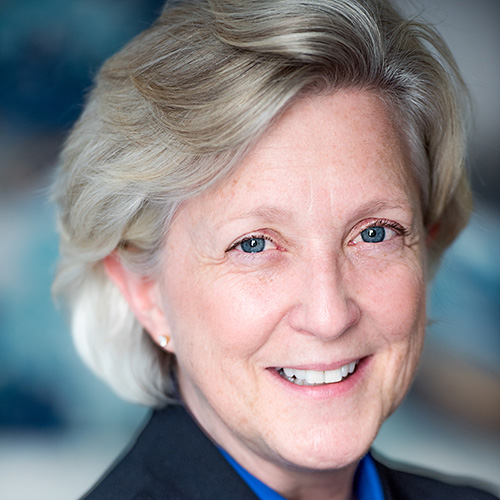  Kyle Zimmer is President, CEO and Co-founder of First Book. A nonprofit social enterprise, First Book amplifies the voice of more than half a million educators serving children in need ages 0-18, and responds to educator-identified issues with best-in-class, diverse and inclusive books, basic needs items, and a full range of expert-informed resources to serve the whole child. Kyle Zimmer is President, CEO and Co-founder of First Book. A nonprofit social enterprise, First Book amplifies the voice of more than half a million educators serving children in need ages 0-18, and responds to educator-identified issues with best-in-class, diverse and inclusive books, basic needs items, and a full range of expert-informed resources to serve the whole child. |
Kyle Zimmer: Why Literacy and Diverse Books Go Hand-in-Hand
You can’t teach a person to play the piano without a piano, and you can’t teach a child to love to read without high quality, relevant books. For kids in poverty, books are scarce, but a lack of culturally relevant books particularly undermines children of color. Publishers are making progress, but there are too few and they are too expensive, putting them out of reach for families in need. Real progress requires a systemic approach, so First Book launched the Stories for All ProjectTM including:
|
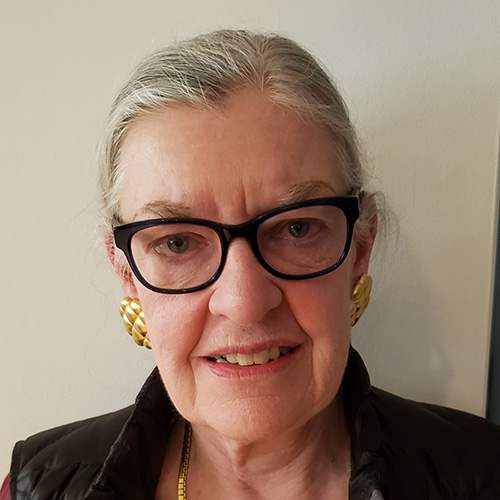  Dr. Catherine E. Snow is the Patricia Albjerg Graham Professor at the Harvard Graduate School of Education (HGSE). She received her Ph.D. in developmental psychology from McGill University during the heyday of nativism in child language research, having chosen to work on the distinctively untrendy topic of how adult speech to children supports their language development. She subsequently worked in the Linguistics Department of the University of Amsterdam before moving to Harvard, where her interests expanded to include literacy development. She chaired the National Academy of Sciences Committee that produced Preventing Reading Difficulties in Young Children (1998) and the RAND Reading Study Group that produced Reading for Understanding: Toward an R&D program for reading comprehension (2000), a volume that influenced the federal education funding agenda over the next 20 years. Her work has been characterized by a willingness to defend unpopular positions on questions of relevance to language learning, early childhood education and literacy instruction. Much of her recent work has been carried out in collaborations with educational practitioners and other researchers focused on understanding the most urgent problems of practice in literacy education. Dr. Catherine E. Snow is the Patricia Albjerg Graham Professor at the Harvard Graduate School of Education (HGSE). She received her Ph.D. in developmental psychology from McGill University during the heyday of nativism in child language research, having chosen to work on the distinctively untrendy topic of how adult speech to children supports their language development. She subsequently worked in the Linguistics Department of the University of Amsterdam before moving to Harvard, where her interests expanded to include literacy development. She chaired the National Academy of Sciences Committee that produced Preventing Reading Difficulties in Young Children (1998) and the RAND Reading Study Group that produced Reading for Understanding: Toward an R&D program for reading comprehension (2000), a volume that influenced the federal education funding agenda over the next 20 years. Her work has been characterized by a willingness to defend unpopular positions on questions of relevance to language learning, early childhood education and literacy instruction. Much of her recent work has been carried out in collaborations with educational practitioners and other researchers focused on understanding the most urgent problems of practice in literacy education. |
Dr. Catherine Snow
Literacy is hard to pin down. The word gets diluted when used for all sorts of skills (math literacy, media literacy, computer literacy), but even for purists like me, who use it only in the traditional sense, it has a huge scope. Of course the precocious 3rd grader engrossed in Harry Potter is doing literacy, and in the process benefitting from opportunities to practice decoding, to learn sophisticated vocabulary, to comprehend complex language and to enter a world of imagination shared with millions of children and adults. But the grade-level 1st grader who is laboriously sounding out simple sentences or producing charming invented spellings is also doing literacy, as is the 3 year old scribble-drawing her own shopping list for the grocery store. For parents and young children, literacy most often takes the form of reading picture books together. This practice contributes to children’s development in multiple ways, whether or not the parent is actually ‘reading.’ Telling the story of narrative books, discussing various interpretations of what happened and why, or gleaning information about intriguing topics like frogs and dinosaurs and volcanoes from information books may require only looking at pictures rather than reading the text. And if children are to reap the cognitive, literacy and language benefits, they need to talk about the book: give and take, questions and answers, interaction with adults and with the text. Language is the bedrock of literacy development, which is why we urge parents to “read” to children in their own language even if the children will learn to read in a different language. The knowledge accumulated about events, about motivations, about consequences and about frogs or dinosaurs in any language will be there for use in comprehending more advanced texts and in navigating the world in every language the child learns. Video: The Role of Play in Early Learning |
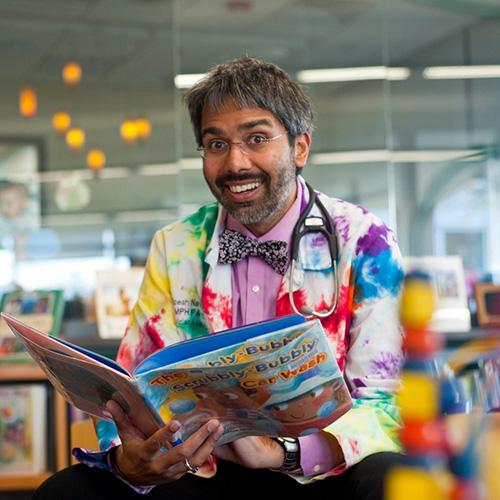  |
Dipesh Navsaria: Shared Reading
When we talk about shared reading, people make the assumption that we’re focused on an education question: helping a young child learn to read so they can eventually read to learn. Certainly that’s a big advantage of reading together with young children, and not to be ignored. But there’s a lot more that early literacy offers beyond this “decoding of letters to derive meaning” that we call “reading.” For one thing, the act of reading with a child is, fundamentally, a relational act: something that happens through an existing relationship. In that process, it modifies that relationship—strengthens, expands and nuances it further if it goes well—or weakens it if it goes poorly, of course. Extraordinary, long-standing research from multiple fields have clearly shown us that the number one driver of development in children is how they interact and engage with others in their environment. It’s far too easy, however, to simply resort to exhortations to “play, read, talk and sing with your child!” Parents hear that, and want to do it, but how? If it hasn’t been modeled for you, how would you know if you’re doing it right? By coaching, reinforcing, guiding and modeling how to read together with young children, we not only set up daily habits that improve literacy skills and educational success, we also strengthen safe, stable and nurturing relationships, which are utterly critical for long-term well-being. We can accomplish this through home visiting and other parenting support programs, but if we’re to take this to scale, an existing, near-universal, non-stigmatized access point needs to be used. |



